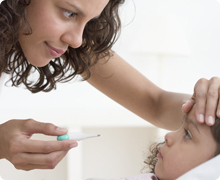Fever
 What is fever?
What is fever?
It is normal for the body’s temperature to change during the day. Exercise, warm clothing and hot weather can cause a small rise in temperature. A fever is a body temperature of over 100.4 degrees F (or 38.0 degrees C). Most of the time fever is not harmful. Fever is the body’s way of fighting an illness.
Treatment of a Fever
You do not always need to treat a fever. The best thing to do is to watch how your child acts. Are they eating and sleeping well? How do they look? Do they play at times? If they are not comfortable, you can try these tips.
Things you should do for a fever:
- Offer extra fluids to drink all through the day.
- Dress your child in comfortable clothes or pajamas. Avoid too many clothes or bundling. This can raise body temperature.
- Decide if your child is comfortable. If not, you can give acetaminophen (Tylenol) if your child is over 3 months old. You can give acetaminophen or ibuprofen (Motrin) if your child is over 6 months old. Make sure to give the correct dose based on your child’s weight. Use the measuring tool that came with the medicine. Follow the instructions on the medicine.
- Make sure your child gets enough rest. Visit Activities for Children Sick at Home for ideas for things your child can do when they're not sleeping.
Things you should not do for a fever:
- Do not use rubbing alcohol or ice water to cool your child down.
- Don’t worry if your child is not eating solid food. Liquids are needed most during a fever.
- Don’t wake your child up to give them fever medicine.
- Don’t ever give aspirin to your child.
- Don’t give fever medicine to a baby under 3 months old, unless told to by a doctor.
- Don’t use ibuprofen for babies less than 6 months unless told to by a doctor.
- Don’t switch between acetaminophen and ibuprofen unless told to do so by your doctor. Choose one and stick with the dosing schedule to avoid the risk of giving too much.
Call the doctor if your child:
- Is less than 3 months and has a fever. Call right away.
- Is 3 months to 2 years old, has had a fever for more than 24 hours and has no other symptoms.
- Has a fever for more than 3 days.
- Is in pain or complains of pain, especially in the neck, ears or throat.
- Is very cranky or sleepy.
- Has trouble breathing or is breathing fast.
- Has a seizure.
- Has a rash (except chicken pox).
- Has dry lips, tongue or mouth.
- Vomits often or for more than a day.
- Has not wet a diaper or gone pee in 8 hours.
- Has a chronic health condition that weakens their immune system.
- Has a fever of over 104 degrees F (or 40 degrees C)
- Is not alert when awake (lethargic).

